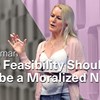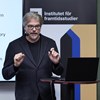oughts
How should we make decisions when we’re uncertain about what we ought, morally, to do?
Very often we are uncertain about what we ought, morally,to do. We do not know how to weigh the interests of animals against humans, how strong our duties are to improve the lives of distant strangers
Workshop on Social Normativity
Venue: Institute for Futures Studies, Holländargatan 13, Stockholm Organizers: Eline Geritsen, Johan Brännmark, and Åsa Burman.If you wish to join parts of this workshop, get in touch with Åsa Burman, a
Non Ideal Social Ontology III
PROGRAM Printable program as pdf-file. 11th of June: Implicit bias Room: Meeting room, Institute for Futures Studies, Holländargatan 13, Stockholm 09.00 Welcome 09.15–10.30 Robin Zheng (Yale-NUS College) “Re” 11.00–12.15 Åsa Burman (Stockholm University & Institute for Futures Studies) ””
Laura Valentini: There Are No Natural Rights: Rights, Duties and Positive Norms
Laura Valentini, Associate Professor of Political Science at London School of Economics ABSTRACTMany contemporary philosophers—of a broadly deontological disposition—believe that there exist some pre-i. In this paper, I defend this unpopular view. I argue that all rights are grounded in —namely, norms constituted by the collective acceptance of gives “oughts”—, provided the norms’ content meets some independent standards of moral acceptability. This view, I suggest, does justice to the relational nature of rights, by explaining how it is that right-holders acquire the authority to demand certain actions (or omissions) from duty-bearers. Furthermore, the view does not divest human beings of fundamental moral protections. Even if, absent some rights-grounding positive norms, obligations cannot be to others, we still have (non-directed) placing constraints on how we may permissibly treat one Another.
Non Ideal Social Ontology III
By 'non-ideal social ontology', we have in mind social ontology that starts with difficult, complicated cases of immediate importance to social theory, rather than starting from simplified or abstractOur thinking is that just as critical philosophers of race such as Charles Mills have made a case for the importance of non-ideal political philosophy, non-ideal social ontology could play an important role in advancing emancipatory social theory. 09.00 Welcome 09.15–10.30 Robin Zheng (Yale-NUS College) “Responding to Bias: Oughts, Ideals, and Appraisals” 11.00–12.15 Åsa Burman (Stockholm University & Institute for Futures Studies) ”Collective responsibility for implicit bias” 12.15–13.30 Lunch 13.30–14.45 Katharina Berndt Rasmussen (Institute for Futures Studies) ”Implicit bias and discrimination” 15.15–16.30 Alex Madva (California State Polytechnic University), ”Responsibility for Interpreting Implicit Bias” 19.00 Workshop dinner 09.00–10.15 Rebecca Mason (University of San Francisco) ”Oppression and Incredulity” 10.30–11.45 Johan Brännmark (Malmö University) ”Institutions, Ideology, and Non-Ideal Social Ontology” 11.45–13.15 Lunch 13.15–14.30 Staffan Carlshamre (Stockholm University) ”Natural kinds, social kinds, mixed kinds” 14.45–16.00 Katharine Jenkins (University of Nottingham) ”Sex and gender, grounding and anchoring” Organized by Åsa Burman & Katharina Berndt Rasmussen. Sponsored by Jane and Dan Olsson Foundation, Institute for Futures Studies, and the Department of Philosophy, Stockholm University Questions? Please contact:
Disease prioritarianism: A Flawed Principle
Medicine, Health Care and Philosophy, May 2015. DOI 10.1007/s11019-015-9649-2 Disease prioritarianism is a principle that is often implicitly or explicitly employed in the realm of healthcare prioritiz
Eva Erman: Why feasibility need not and should not be a moralized notion
Venue: Institute for Futures Studies, Holländargatan 13 in Stockholm, or online. Research seminar with Eva Erman, Professor of Political Science at Stockholm University. Her research focuses on democrat

Eva Erman: Why Feasibility Need Not and Should Not be a Moralized Notion
Research seminar with Eva Erman, Professor of Political Science at Stockholm University. Her research focuses on democratic theory, specifically on questions of democracy beyond the state, in a global

Vuko Andric
I am a researcher at the Institute for Futures Studies and associate professor at Linköping University. My main research interests lie in ethics and political philosophy. In ethics I am particularly i

Moral uncertainty
Participants: Krister Bykvist, Toby Ord and William MacAskill. Very often we are uncertain about what we ought, morally, to do. We do not know how to weigh the interests of animals against humans, how








